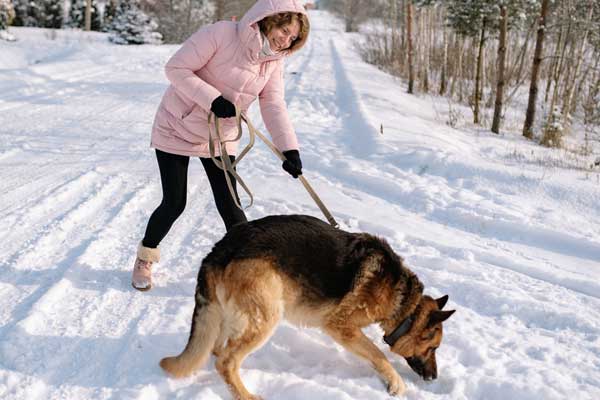Should You Spay or Neuter a German Shepherd? Protect Their Health and Save Their Life
As a German Shepherd owner, consider neutering or spaying your dog. This is a crucial decision to make and should not be taken lightly. Neutering or spaying can have health benefits for your pet as well as reduce the number of unwanted puppies in shelters.
It’s essential to understand when to neuter or spay a German Shepherd, the procedure, and how to best prepare your pet for surgery.
In this blog post, we’ll look at all these topics and provide some helpful resources so you can make an informed decision about neutering or spaying your German Shepherd.
Should You Neuter or Spay a German Shepherd
Yes, Neutering or spaying a German shepherd comes with numerous benefits. Not only does it help reduce the number of unwanted litters, but it can also help protect your pet against serious health problems and many behavioral issues related to its mating instinct.
Removing the ovaries from female GSDs will eliminate heat cycles and reduce unwanted behaviors that can be frustrating for pet owners. Removing the testes from male GSDs will reduce the breeding instinct and make them less likely to wander, allowing them to focus more on being your loyal companion.
Early spaying of female German shepherds can help protect against uterine infections and breast cancer. Neutering male GSDs can help lower the risk of the enlarged prostate gland and testicular cancer.
Also, neutering or spaying will only impact your pet’s intelligence and ability to learn, play, work, or hunt. It may make them better behaved, making them even more enjoyable and lovable pets.
So if you’re the proud owner of a German shepherd, consider neutering or spaying to maximize your pet’s health and well-being. It’s a win-win for both you and your four-legged friend!
Difference Between Neutering or Spaying a German Shepherd
Neutering or spaying a German Shepherd is an essential decision for pet owners, as it can help reduce the risk of pet overpopulation in the future.
Neutering or spaying involves surgically removing specific reproductive organs so animals cannot reproduce.
In particular, the procedure is called “neutering” for male animals. It involves the removal of the testes, while in female animals, it is referred to as “spaying” and involves the removal of the ovaries, fallopian tubes, and uterus.
Depending on a pet owner’s preferences, surgical alternatives such as hysterectomy for females, vasectomy for males, and nonsurgical sterilization options are available.
Ultimately, you must ensure that your pet and family are appropriately cared for whatever route you take!
When to Spay or Neuter My German Shepherd
To optimize the pup’s health and behavior, a German Shepherd should be neutered or spayed at the right time.
Generally, it is recommended to wait until the German Shepherd is at least one year old before deciding to neuter or spay, as this can help reduce the risk of developing joint disorders such as hip dysplasia.
Also, it’s important to note that spaying or neutering too early can pose a risk for specific health issues, such as an increased risk of infections and mammary tumors in female dogs.
It is a good idea to consult with your vet before making any decisions regarding spaying or neutering your German Shepherd.
How to Recover From Spay and Neuter Surgery
German Shepherds owners should follow some precautions the ASPCA recommends to ensure their pet’s smooth and successful recovery.
Firstly, the dog should be kept inside and away from other animals during recovery. Per the vet’s advice, dogs should not be allowed to run around, jump on and off, or lick their incision site for up to 2 weeks after surgery.
The incision should be checked daily to ensure it’s healing correctly, and any redness, swelling, discharge, or foul odor should be reported to the vet immediately. Additionally, the dog should not have a bath for at least ten days post-surgery.
If your German Shepherd is uncomfortable, lethargic, eating less, vomiting, or has diarrhea during this time, you should call your vet.
Discussing with the vet before the procedure is also recommended, as pain medication may be needed.
An excellent way to gauge the dog’s recovery is that they are likely doing okay if they are comfortable and energetic enough to play. However, a playful dog should not be allowed to run around before they are fully healed.
Following these guidelines, German Shepherd owners can help ensure their beloved pets recover safely and successfully from spaying or neutering.
Potential Risks for Spay and Neuter Surgery
When considering spay and neuter surgery for a German Shepherd, it is crucial to understand that there are always some risks associated with any surgical procedure and general anesthesia.
To reduce the potential risks, owners should ensure that their dog has a thorough physical examination before surgery and may choose to have blood work done to identify any underlying health issues.
Ultimately, spay and neuter surgeries can be done safely with minimal risks when performed by an experienced veterinarian using the proper equipment.
While these surgeries may seem daunting at first, it’s important to remember that they are often necessary to ensure a long, healthy life for our furry friends!
How Much It Cost to Neuter or Spay Your German Shepherd?
The cost of these procedures can vary drastically depending on geographic area and the dog’s size. Most animal hospitals charge upwards of 300 dollars for the spay or neutering surgery.
Low-cost clinics charge anywhere from 45 to 135 dollars for the same procedure. But don’t despair; there is hope!
SpayUSA and ASPCA have searchable national databases to help owners find affordable spaying or neutering options. Plus, many local municipalities offer discounted rates on spay and neuter procedures.
So if you want to save a few bucks, researching your options is worth exploring! And remember, even though the cost is low, the quality of care will be as high as what you would get from private practice.
Be sure to ask for a breakdown of costs associated with the procedure so you’ll know exactly what you’re getting for your money. All in all, spaying or neutering your German Shepherd doesn’t have to break the bank!
With some research and savvy shopping, you can find much more affordable options that still provide excellent care. So don’t delay – get those furry (or not-so-furry) friends taken care of today.
Alternatives to Neutering or Spaying German Shepherd
Unfortunately, German Shepherds can also be prone to health problems if not spayed or neutered.
Fortunately, there are alternatives that pet owners can consider for their German Shepherd that will still provide the benefits of avoiding unwanted pregnancies but without the risk associated with sterilization surgery.
For females, an ovary-sparing spay (OSS) is an excellent option as it removes the uterus and cervix while leaving the ovaries intact—ensuring that vital sex hormones remain in the dog’s body.
Additionally, males can consider a vasectomy procedure which involves cutting or clamping the sperm tubes so that sperm can’t travel to the female. With OSS or Vasectomy, there is no risk of Pyometra (infection of the uterus) because either the entire uterus has been removed (OSS) or the sperm can’t reach the female (Vasectomy).
While both procedures still involve anesthesia, they are far less invasive than a complete neuter and carry fewer health risks.
Pet owners should be aware that these procedures are not widely available, so they will have to search for veterinary practices offering them.
Additionally, there may still be some health risks associated with the procedure, and it is crucial to understand those before proceeding.
However, OSS and Vasectomies provide a far healthier alternative to full neutering without the side effects of removing ovaries.
Still, ovarian cancer is rare, and the slight risk does not outweigh the health benefits of preserving those vital sex hormones.
So if you’re looking for an option that will leave your German Shepherd in optimal health, these procedures are worth considering.
Ultimately, you must be informed about all your options regarding sterilization for your German Shepherd.
Whether you choose a complete neuter or opt for an OSS or Vasectomy procedure, the key is to make sure you decide based on facts and not just hearsay.
Conclusion
Neutering offers many health benefits for both male and female dogs but can also come with risks.
Alternatives such as OSS and Vasectomy are available if full neutering isn’t an option and provide a much healthier alternative without the side effects of removing ovaries.
Regardless of what route you choose to take, it’s essential to do your research so that you understand all of your options before making this critical decision about your beloved pet!
Overall, whether you decide to spay or neuter your German Shepherd is a personal decision that should be based on the facts.









